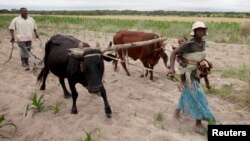When the British Union Jack flag was lowered and a new Zimbabwean flag hoisted to tune of the old national anthem "Ishe Komborera Africa", there was jubilation and ululation that Zimbabwe had finally attained its independence.
There was hope that land, which was the cornerstone of the liberation struggle, would be equitably redistributed to local people. But this remains a pipe dream, almost 36 years after independence. Some of the disgruntled people are in Mashonaland West province, who have almost lost hope of getting prime land in their lifetime.
Though some of them were allocated land under the controversial 2000 land reforms, millions of local people are still landless. They are scratching a living from pieces of land allocated to them under the colonial regime that uprooted them from their prime land.
Some lucky ones, who benefited under the Zanu PF championed land reforms in 2000, are now multiple farm owners. They forcibly took over land owned by white commercial farmers.
Hurungwe farmer, Panashe Mtundusha, who has a pending land ownership wrangle case in the Chinhoyi courts over the double allocation of Two Tree Farm, says indications are that the land issue won’t be resolved anytime soon in Zimbabwe.
He believes that people with multiple farms should surrender them to landless peasants.
Mhangura villager, Onisimo Tagarika, supports such moves, adding that Zimbabwe should conduct a land audit that should result in the redistribution of land to some communal farmers, including women and youth.
Melody Chinowaita of Chinhoyi agrees, noting that the redistribution of land would play a critical role in addressing drought and other issues related to food insecurity.
Chinowaita says women should benefit from a fresh land program.
A young Chinhoyi resident, Misheck Rangwani, says they are few people of his age group who were allocated land under the present agrarian reforms.
But Clifford Khupheko, a Zanu PF activist who is also a beneficiary of the country’s controversial land reform program, says most Zimbabweans are happy as they were allocated land once owned by white commercial farmers.
Some political analysts argue that it is likely that there would be another land revolution in Zimbabwe in the near future targeted at multiple farm owners.






